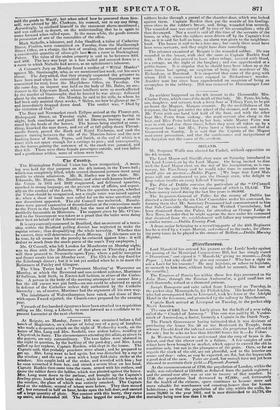1+11.4ccitancoud.
Lord 'Mansfield has entered his protest on the Lords' books against the passing of the 'Municipal Corporations Bill, but has simply stated " Dissentient," and signed it " Mansfield," giving no reasons.—Dally Paper. [Amid why should he give any reasons? Who has a right to ask a Lord for his reasons? He may legislate, or refuse to legislate, as seetneth to him best, without being called to account, like one of the canaille.] The Empress of Russia has within these few days presented to Sir John nosS, through the Russian Ambassador, a gold snuff-box set with diamonds, valued at a thousand guineas.
Joseph Bonaparte and suite sailed from Liverpool on Tuesday, in the packet-ship Monongahela' for Philadelphia. His brother Lucien, who had accompanied him to Liverpool, took his leave at the Adelphi Hotel in the forenoon, and proceeded by the railway to Manchester.
Captain Back arrived at Liverpool on Tuesday, in the packet-ship Non-;h America. The sum of 640/. has been lately given for the bulb of a new tulip, called the " Citadel of Antwerp." This sum was paid by M. Vander- ninck of Amsterdam, a florist, formerly a Captain in the Dutch Navy.
The French Government having intimated that it was desirous of purchasing the house No. 50 on tile Boulevard du Temple, from whence Fiesehi fired the infernal machine, the proprietor has offered it for sale ; but he asks no less than 130,000 francs for it.—Le Volettr.
In Western Somerset we understand that the crop of beans is de- ficient, mid that the clover seed is a failure. A few samples of new wlieat have been brought to market, which appear to exceed the old in condition only. but not in the plumpness of the grain. Oats, so far as regards the stock of the old, are not plentiful, and in the interior are scarce and dear : sales, as may be expected, are flat, but the buyers talk a good deal of the new. Tares are good, but enough have not yet been thrasned to ascertain their yie141.—Plumoutle Journal.
At the commencement of 1700, the population of London, within the walls, was calculated at 110,000, as deduced from the parish-registers; and the annual mor ality was as one to twenty of that number. In 1750, the population had decreased to 87,000; and, fortunately for the health of the citizens, space continues to become more and more valuable for warehouses and counting-houses than for human habitations; so that the population of the city, within the walls, be- came 78,000 in the year 1801, and is now diminished to 55,778, the mortality being now less than 1 in 40.


























 Previous page
Previous page